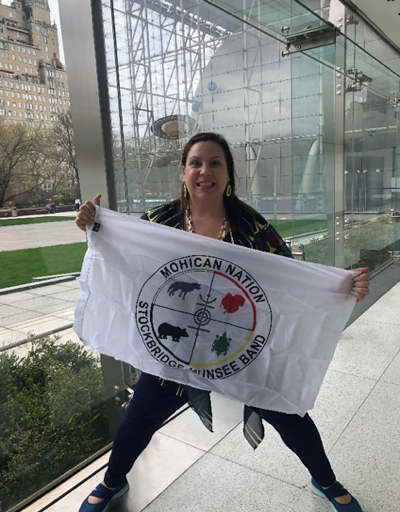My name is Stephanie Evergreen and Dr. Nicole Bowman has changed my experience as a member of AEA. She’s changed yours, too, even if you don’t know it. Dr. Nicole Bowman, the 2018 Robert Ingle AEA Service Award recipient, has worked publicly and behind the scenes to push evaluators to grow their cultural competency, specifically and critically as it relates to Native American considerations, rights, and sovereignty.
Even though her work is often the tiresome, hidden kind – lots of meetings in task forces and committees – you have likely seen Dr. Bowman’s efforts at our annual conference. Remember how, a few years back, we started the opening plenary with an indigenous ceremony? This both honors the launch of our time together once a year and reminds us of the history of the ground on which we gather. That’s Nicky’s work.
Annually, since 2012, she has provided opening and/or closing ceremony remarks, cultural regalia display, and/or facilitated Indigenous Program Evaluation TIG members in offering a prayer, song, or traditional drum or flute music at AEA (and CREA). In 2012 she even gifted the turkey to the local indigenous family that harvested its feathers for the ceremonial bustle you probably Instagrammed.
Dr. Bowman is a member of the Stockbridge Munsee Band of the Mohicans Community in Wisconsin. Her spirit name, Waapalaneexkweew Neeka Ha Newetkaski Newa Opalanwuuk, translates in English as Flying Eagle Woman, Accompanied by Four Eagles, which means that she feels a special obligation to support and bring other evaluators along with her in the effort to incorporate culture and context in evaluations. Her service in EvalPartners, EvalIndigenous, and too many TIGs and task forces to list have contributed to our professions’ development. The bottom line is that Waapalaneexkweew has brought issues of equity and justice to the forefront in evaluation.
Waapalaneexkweew is actively involved in developing the next generation of culturally competent evaluators. And, as usual, she uses her position not just to educate white evaluators but also to serve native populations. She has trained and provided technical assistance to Native American groups on how to identify, value, and protect cultural heritage generally, but especially as part of evaluations and other inquiry and engagement processes. She produced a policy paper for the National Congress of American Indians, which is the umbrella organization for all 573 tribes, about policy and evaluation research protocols, including special attention to protecting Native American intellectual and cultural property in all of its forms. Native Americans have been focused on protecting their land, which is always under threat, but Dr. Bowman has illustrated that protecting other cultural and intellectual property is no less important, and, indeed, is crucial to meeting the cultural competency standards and guiding principles of evaluation.
Though we have much more work to do, one reason that AEA has been feeling more responsive and inclusive in recent years is because of how hard Nicky Bowman works to make it so. Dr. Bowman has been tireless in her pursuit to help AEA become a better, more culturally responsive organization and to help its members – us – become better, more culturally responsive humans and evaluators.
Rad Resources:
- Stranger (En)Danger: Continued Colonial Impacts on Kukuna Áhkuy by Waapalaneexkweew A.K.A. Nicole Bowman (Mohican/Lunaape), AEA365, May 29, 2019.
- Engaging young people in online consultations using Slack by Dr. Natasha Koustova and Kimberly Bowman, AEA365, December 11, 2018.
- Indigenous Evaluators without Borders: IPE TIG Participation Nationally and Globally by Nicky Bowman, AEA365, November 20, 2017
- Nicole Bowman-Farrell on The Origin of Bowman Performance Consulting, July 6, 2017

The American Evaluation Association is celebrating Labor Day Week in Evaluation: Honoring and appreciating those who have labored on behalf of the evaluation profession. The contributions this week are tributes to evaluators who have labored conscientiously and with distinction on behalf of the evaluation profession. Do you have questions, concerns, kudos, or content to extend this aea365 contribution? Please add them in the comments section for this post on the aea365 webpage so that we may enrich our community of practice. Would you like to submit an aea365 Tip? Please send a note of interest to aea365@eval.org . aea365 is sponsored by the American Evaluation Association and provides a Tip-a-Day by and for evaluators.

Thank you for shedding light on Dr. Bowman’s incredible work in bringing about awareness for evaluators when thinking about cultural competency. I especially enjoyed her article, “No More Pranks-giving” and the importance of including and seeing evaluation through an Indigenous lens. When evaluation processes consider the stories and history of others (Dr. Bowman’s focus in an Indigenous context) ‘evaluative foundations are aware, accurate, and informed’ according to Dr. Bowman. I especially connected with her statement about the responsibility of evaluators to do these things if they see themselves as being a part of a global evaluation community. Learning from leaders like Dr. Bowman and applying that knowledge into the way evaluation is formed on a global scale is sure to bring about positive change.